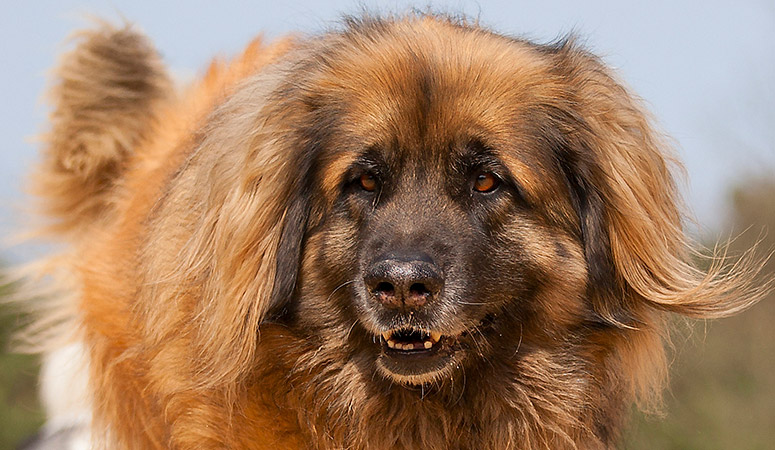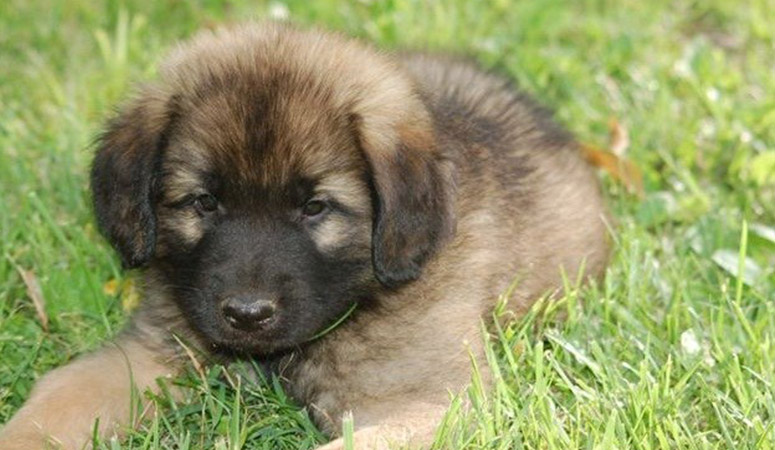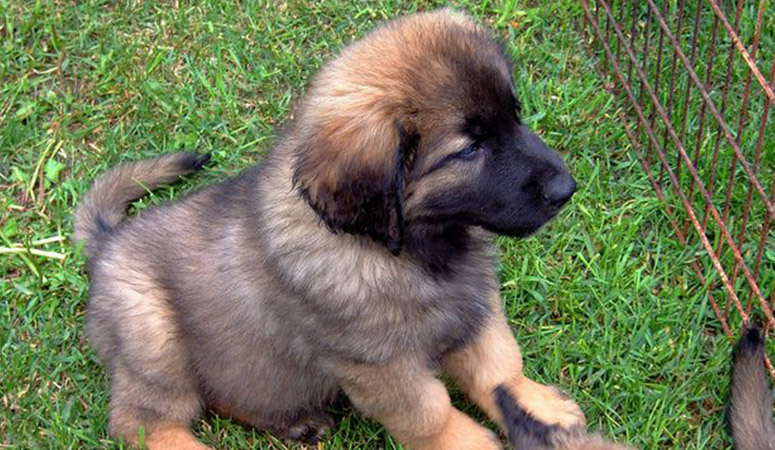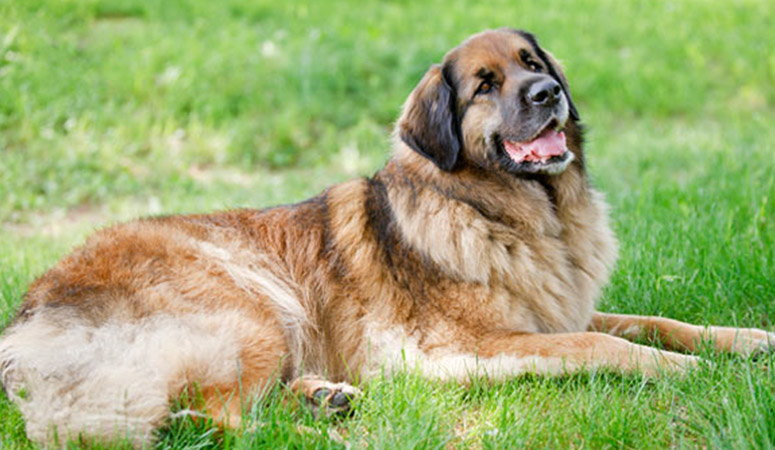Leonberger
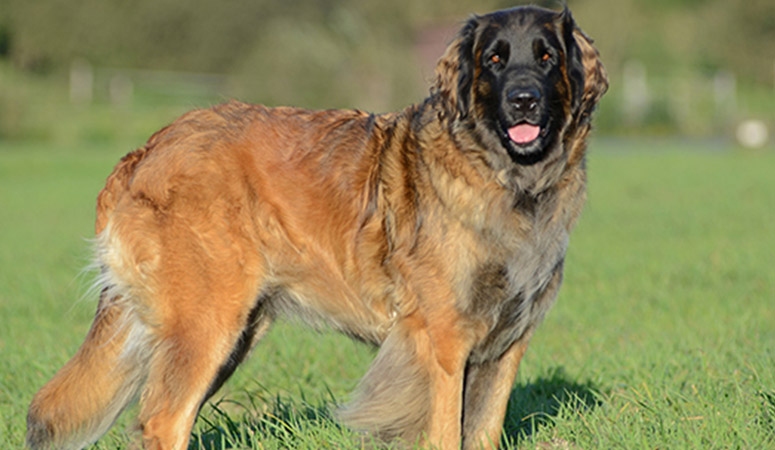
Originated from Germany, the Leonberger is a giant, muscular working dog that has a gentle nature and calm patience. They are very suitable for the original purpose of the family dogs, farm dogs, and draft dogs. And plenty of early socialization would help Leonberger to be loyal and trainable.
| Other Names | |
| Color | Red, Reddish Brown, Sandy, Yellow |
| Height | Males: 28-32 inches. Females: 25-29 inches. |
| Weight | Males: 80-150 pounds. Females: 80-150 pounds. |
| Life Span | 9 years |
| Personality | Friendly, Gentle, Playful |
| Exercise | Regular Exercise |
| Origin |
| Popularity | #95 |
| Groom Needs | Daily |
| Kids Friendly | Yes |
| Dog Friendly | Yes with supervision |
| Watch Dog | |
| Family Dog | |
| Litter Size | 6-10 |
Leonberger Pictures
Leonberger Video
Introduction
The Leonberger is a breed of dogs that gets its name from Leonberg, a city in Baden-Wurttemberg, Germany. It is in the working group for dog shows and is a giant of a dog.
The Leonberger has a double coat which is water-resistant. The outer coat is long and profuse. It is also relatively straight, flat, and lies close to the dog’s body. A mature, male Leonberger has a pronounced mane. The undercoat which is climate permitting is soft and dense. There is a great variety of coat colors that are acceptable when it comes to the Leonberger dog; this includes all combinations of lion-yellow, red, red-brown, and sand. Its nose leather, lips, and footpads should always be black. A little white on its chest or toes is permitted and colors that are not allowed are brown with brown nose leather, black, and tan, black, white or silver, and the eyes without any brown.
The Leonberger is large and muscular. Its head possesses a black mask. Its chest is made to fit its demanding work, it is broad and deep, just about right for the kind of work it does.
A male Leonberger weighs around 120-170 lbs and stands between 28 and 31 inches at the shoulders. A female Leonberger weighs 100-135 lbs and stands at 26-30 inches at the shoulder. The Leonberger is known as a family dog with desirable characteristics that are both important and distinguishing. The Leonberger dog is a self-assured dog that is well socialized. It is obedient and submissive to members of its family, it is friendly with children and non-aggressive when it comes across, passers-by. It is known to be playful, loyal, and intelligent. They are easily adaptable to a variety of circumstances and adjust well to the introduction of other dogs. It is important to expose it to early socialization and training because it is a giant dog.
Its life span is 8-9 years. These dogs are generally healthy. Hip dysplasia which is a common health problem among several large breeds is controlled by breeders of the Leonberger. The Leonberger is screened by its breeders and any dog showing signs of dysplasia is left out of the gene pool. This has effectively reduced the incidence of hip dysplasia in the breed by 10%.
Living with Leonberger
The Leonberger has a long, double coat that sheds heavily, especially in the shedding seasons. Your Leonberger should be brushed every day, especially in the areas of his body that tend to mat – the long hair behind the ears and on the back of the legs. Weekly brushing is helpful to keep the dog’s coat and skin healthy and reduce shedding. During the shedding season in the spring and fall, daily brushing is necessary.
The Leonberger has a thick, full outer coat and a shorter, fluffier undercoat. A metal comb and an undercoat rake are useful to work out the undercoat, and a pin brush and a slicker brush can help neaten up the outer coat.
The owner needs to check your dog’s ear every week and brush the teeth several times a week to keep fresh breath and prevent gum disease. Besides, trim your dog’s nails every other week.
Exercise is very important for a Leonberger. They may become destructive and difficult to deal with if not given enough exercise. Leo loves being with his human family and wouldn’t be happy to spend time alone in the backyard. And it is suggested to give your Leonberger about an hour exercise daily.
Leos are not suitable for people who live in a city apartment or a house on a small, suburban lot. Puppies are active and exuberant, adult dogs are generally calm and gentle, but they still need to have some vigorous exercise every day. Jogging or hiking with their owners or keeping pace alongside a bicycle are good options.
The Leonberger may need up to eight cups of food per day, split between three meals. And there should be fresh and clean water at all times. More importantly, the food amount should depend on the dog’s weight, size, age, and activity level. Leonbergers are prone to suffer bloat, small meals given multiple times per day and limited exercise after feeding can help prevent the condition.
Some dogs are easy to get overweight, so you need to watch their calorie consumption and weight level all the time. Treats may be an important aid in training, but excessive intake can lead to obesity. Also, owners need to distinguish which human food is safe for dogs and which are not. If you have any problems with your dog’s weight or diet, just consult from your veterinarian.
Leonbergers are prone to the following health conditions: hip and elbow dysplasia, eye concerns, hypothyroidism, bloat, Addison’s disease, etc.
Major concerns: CHD
Minor concerns: gastric torsion, elbow dysplasia, osteosarcoma
Occasionally seen: polyneuropathy, entropion, ectropion
Suggested tests: Hip Evaluation
Elbow Evaluation
LPN1 DNA Test
LPN2 DNA Test
Thyroid Evaluation
Ophthalmologist Exam (CERF)
LEMP (Leukoencephalomyelopathy) DNA Test
Total Annual Cost: $3538
Cost is estimated for the first year and may vary depending on many factors, such as dog food, health care, leash, collar, licensing, possible fencing, crates, training and obedience classes, dog-walking, grooming, treats, toys, flea, tick, and heart-worm meds, microchips, etc.
Early obedience training is very important for a Leonberger puppy. Although they are smart and generally eager to please, the longer the owner wait to begin training, the more stubborn the Leonberger becomes would become. Leo puppies should be socialized before the age of 20 weeks by gently exposed to a wide range of people, animals, and situations. And group obedience sessions are helpful to a Leo become a well-mannered companion and canine citizen. Besides, agility, flyball, water sports, tracking, and advanced obedience training are good options for Leos that they can compete. Also, they can do well as therapy dogs, people in hospitals and nursing homes enjoy spending time with them.
History
The Leonberger has its origin from Leonberg in Germany. Heinrich Essig, a dog breeder and seller (also the mayor of the town of Leonberg in Baden- Wurttemberg, Germany), claimed that he had created the Leonberger breed through the crossing of a female Landseer Newfoundland with a male from the Great St. Bernard Hospice and Monastery. This was in 1830. The dog was bred with the idea of making it appear like the lion on the coat-of-arms of Leonberg. The modern look of the Leonberger breed was developed in the late 20th century by the reintroduction of some breeds, such as the Newfoundland. On January 1st, 2010, the American Kennel Club gave recognition to the Leonberger as a member of the Working Group.
Helpful Information
Breed Club: LEONBERGER CLUB OF AMERICA
Breed Club Link: http://www.leonbergerclubofamerica.com/
Breed Club Rescue: Leonberger Rescue Pals Inc
Breed Club Rescue Link: http://www.leonberger-rescue.org/

